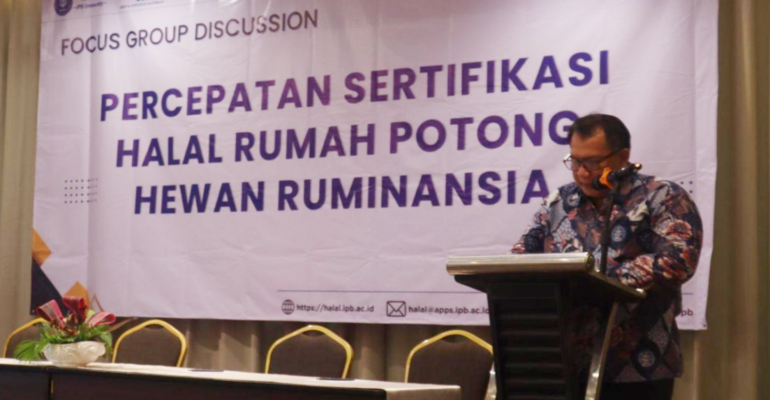HSC IPB University Accelerates Halal Certification of Ruminant Slaughterhouses

Halal Science Center (HSC) held a Focus Group Discussion: Acceleration of Halal Certification of Ruminant Slaughterhouses (RPH), Monday (25/3) in Jakarta. This activity is a collaboration between HSC IPB University and Meat & Livestock Australia (MLA).
Chief of the International Research Institute for Food, Nutrition, and Health of IPB University, Prof Drajat Martianto in his speech said that the obligation to be halal certified is an important unity with food safety, considering the majority of Indonesia’s population is Muslim.
“Food safety is very important for all products consumed by the community, but it is not only related to food safety, but also about halal certification obligations,” said Prof Drajat. Therefore, he continued, “This FGD is important as a step to get solutions in accelerating halal certification, especially for slaughterhouses as upstream in the halal ecosystem.”
This activity was guided by Prof Khaswar Syamsu, Chief of HSC IPB University and involved various stakeholders related to halal certification of slaughterhouses, including the Halal Product Guarantee Agency (BPJPH), Veterinary Public Health (Kesmavet) Ministry of Agriculture (Kementan), National Committee for Sharia Economics and Finance (KNEKS), DKI Jakarta Food Security, Marine and Agriculture Office (KPKP), Animal Welfare Officers Forum (AWO) Indonesia, Halal Examining Institution (LPH), and slaughterhouse business actors.
On that occasion, Prof Khaswar explained, meat ingredients or products and their derivatives are the most critical ingredients or products and have the highest risk related to unlawfulness in the context of halal certification. Therefore, according to him, slaughterhouses are the first link in the halal supply chain, including for micro, small and medium enterprises (MSMEs).
“If all slaughterhouses are halal certified, then one big problem for industries including MSMEs that use meat ingredients and meat derivative products can be resolved. However, the fact is that the number of ruminant slaughterhouses (RPH-R) that have halal certificates and veterinary control numbers (NKV) is only around 13 per cent, even though the mandatory halal deadline is 17 October 2024,” he said.
“For this reason, the cooperation of all stakeholders is needed to succeed in accelerating halal certification of abattoirs,” said Prof Khaswar.
To accelerate halal certification, MLA Project Support Officer, M Pribadie Nugraha, SPt, MP conveyed the importance of massive socialisation, both for micro, small, medium and large scale abattoirs related to the halal certification obligation.
“Currently, there are 79 RPHs and 165 poultry slaughterhouses (RPH-U) that have NKV and halal certification. However, there are still more than 500 RPHs and U-RPHs that are not halal certified, so the remaining few months to fulfil halal obligations need to be accelerated,” said Ni Putu Desinthya SE, MSc, MIFP, Deputy Director of the KNEKS Halal Product Industry Directorate added.
According to drh Diah Nurhayati, MSi who was present representing the Director of Kesmavet Kementan, one of the Ministry of Agriculture’s strategies in accelerating NKV and halal certification is improving facilities and infrastructure through special allocation funds. It also actively coordinates with other ministries/institutions to facilitate halal certification of slaughterhouses.
According to the Chief of the Centre for Development and Supervision of Halal Product Guarantee BPJPH, the largest number of slaughterhouses are micro-scale businesses and self-registration. “Data as of 21 March 2024 a total of 1,256 slaughterhouses that have been halal certified need to be curated again in order to obtain accurate data specifically for slaughter services,” he said.
In addition to the FGD activities, a halal certificate was handed over by the Chie of BPJPH, Dr H Muhammad Aqil Irham. A number of abattoirs that received halal certification included Santi Wijaya Meat Abattoir, Badru Salam Abattoir, and Manglayang Abatoar Abattoir. All three are participants in the halal certification technical guidance programme facilitated by MLA and HSC IPB University. (*/Rz) (IAAS/RUM)



